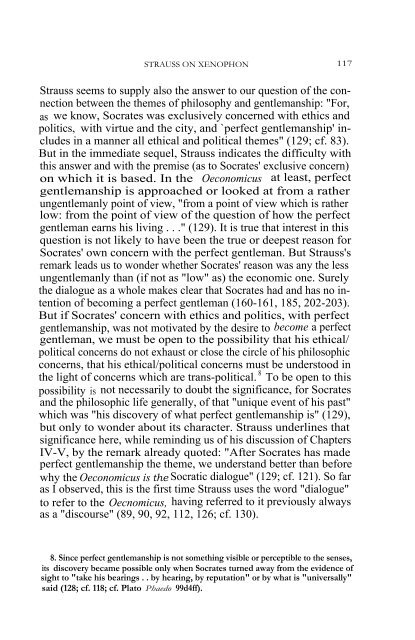Strauss on Xenophon's Socrates Xenophon's Socratic Discourse: An ...
Strauss on Xenophon's Socrates Xenophon's Socratic Discourse: An ...
Strauss on Xenophon's Socrates Xenophon's Socratic Discourse: An ...
Create successful ePaper yourself
Turn your PDF publications into a flip-book with our unique Google optimized e-Paper software.
STRAUSS ON XENOPHON<br />
<str<strong>on</strong>g>Strauss</str<strong>on</strong>g> seems to supply also the answer to our questi<strong>on</strong> of the c<strong>on</strong>necti<strong>on</strong><br />
between the themes of philosophy and gentlemanship: "For,<br />
as we know, <strong>Socrates</strong> was exclusively c<strong>on</strong>cerned with ethics and<br />
politics, with virtue and the city, and `perfect gentlemanship' includes<br />
in a manner all ethical and political themes" (129; cf. 83).<br />
But in the immediate sequel, <str<strong>on</strong>g>Strauss</str<strong>on</strong>g> indicates the difficulty with<br />
this answer and with the premise (as to <strong>Socrates</strong>' exclusive c<strong>on</strong>cern)<br />
<strong>on</strong> which it is based. In the Oec<strong>on</strong>omicus at least, perfect<br />
gentlemanship is approached or looked at from a rather<br />
ungentlemanly point of view, "from a point of view which is rather<br />
low: from the point of view of the questi<strong>on</strong> of how the perfect<br />
gentleman earns his living . . ." (129). It is true that interest in this<br />
questi<strong>on</strong> is not likely to have been the true or deepest reas<strong>on</strong> for<br />
<strong>Socrates</strong>' own c<strong>on</strong>cern with the perfect gentleman. But <str<strong>on</strong>g>Strauss</str<strong>on</strong>g>'s<br />
remark leads us to w<strong>on</strong>der whether <strong>Socrates</strong>' reas<strong>on</strong> was any the less<br />
ungentlemanly than (if not as "low" as) the ec<strong>on</strong>omic <strong>on</strong>e. Surely<br />
the dialogue as a whole makes clear that <strong>Socrates</strong> had and has no intenti<strong>on</strong><br />
of becoming a perfect gentleman (160-161, 185, 202-203).<br />
But if <strong>Socrates</strong>' c<strong>on</strong>cern with ethics and politics, with perfect<br />
gentlemanship, was not motivated by the desire to become a perfect<br />
gentleman, we must be open to the possibility that his ethical/<br />
political c<strong>on</strong>cerns do not exhaust or close the circle of his philosophic<br />
c<strong>on</strong>cerns, that his ethical/political c<strong>on</strong>cerns must be understood in<br />
the light of c<strong>on</strong>cerns which are trans-political. 8 To be open to this<br />
possibility is not necessarily to doubt the significance, for <strong>Socrates</strong><br />
and the philosophic life generally, of that "unique event of his past"<br />
which was "his discovery of what perfect gentlemanship is" (129),<br />
but <strong>on</strong>ly to w<strong>on</strong>der about its character. <str<strong>on</strong>g>Strauss</str<strong>on</strong>g> underlines that<br />
significance here, while reminding us of his discussi<strong>on</strong> of Chapters<br />
IV-V, by the remark already quoted: "After <strong>Socrates</strong> has made<br />
perfect gentlemanship the theme, we understand better than before<br />
why the Oec<strong>on</strong>omicus is the <strong>Socratic</strong> dialogue" (129; cf. 121). So far<br />
as I observed, this is the first time <str<strong>on</strong>g>Strauss</str<strong>on</strong>g> uses the word "dialogue"<br />
to refer to the Oecnomicus, having referred to it previously always<br />
as a "discourse" (89, 90, 92, 112, 126; cf. 130).<br />
8. Since perfect gentlemanship is not something visible or perceptible to the senses,<br />
its discovery became possible <strong>on</strong>ly when <strong>Socrates</strong> turned away from the evidence of<br />
sight to "take his bearings . . by hearing, by reputati<strong>on</strong>" or by what is "universally"<br />
said (128; cf. 118; cf. Plato Phaedo 99d4ff).<br />
117

















